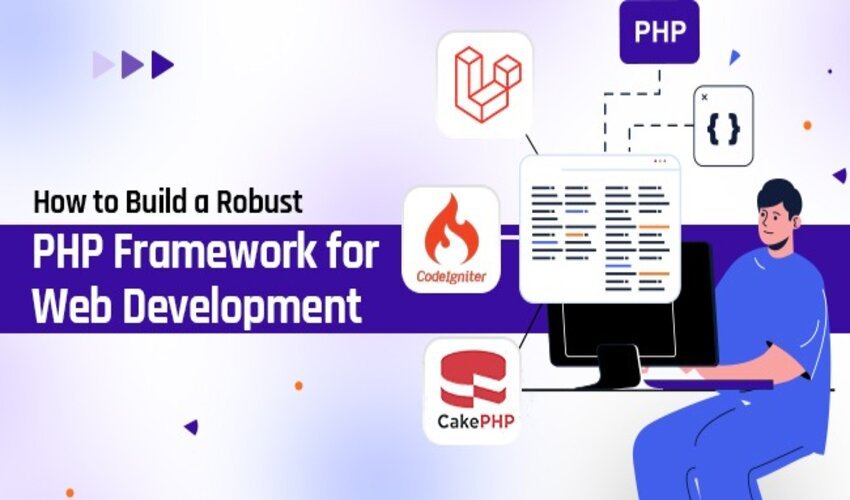
In today’s evolving digital world, the demand for powerful web development tools is on the rise. PHP has emerged as a leading scripting language due to its simplicity, efficiency, and compatibility. While there are many existing frameworks available, creating a customized PHP framework offers advantages such as flexibility and scalability.
This guide aims to provide a comprehensive understanding of building a robust PHP framework. It covers essential components, security measures, and performance best practices, offering step-by-step guidance. Whether you’re an experienced PHP developer or new to web development, this resource equips you with the knowledge and skills to construct a reliable PHP framework tailored to your specific needs. Let’s embark on the journey of creating a functional, adaptable, and robust framework for web development.
What is the PHP framework?
A PHP framework is a platform that simplifies the process of building web applications using the PHP scripting language. It offers reusable code for common tasks, thereby enhancing productivity. PHP frameworks also enforce secure coding practices and follow design patterns like MVC (Model-View-Controller) for easier maintenance. Examples include Laravel, Symfony, CodeIgniter, and Zend.
Popular PHP Frameworks for Web Development
The following are the most popular PHP frameworks for web development:
- Symfony
Symfony is a popular, flexible PHP framework used for building web applications. It offers reusable PHP components, adheres to the MVC architecture for clean code organization, and boasts a vibrant community that contributes to its continuous development. Symfony also stands out for its performance and robust security features, handling authentication and authorization effectively. Its comprehensive documentation and strong support network make it user-friendly for developers at all levels, assisting in the creation of robust, secure, and efficient web applications.
- CodeIgniter
CodeIgniter is an open-source PHP framework known for its simplicity, flexibility, and small footprint. It’s easy to install and offers excellent documentation, making it beginner-friendly. CodeIgniter uses the MVC design pattern, but with a flexible approach, offering developers greater freedom. It’s built for performance, operating efficiently even on servers with limited resources. With strong security features and a rich set of libraries, CodeIgniter provides a robust and efficient platform for building dynamic web applications.
- FuelPHP
FuelPHP is an open-source PHP framework known for its flexibility and modularity. It supports both MVC and HMVC design patterns, promoting code reusability and ease of maintenance. FuelPHP places a strong emphasis on security, providing features such as input/URI filtering and output encoding. It simplifies RESTful API development and has various ORM features for efficient database operations. Its modular architecture allows for customization and performance optimization. Backed by strong community support and well-structured documentation, FuelPHP offers a robust platform for web application development.
- Yii
Yii is a high-performance, open-source PHP framework recognized for its speed, security, and ease of use. It uses the MVC architecture for clean and manageable code and includes robust security features for reliable application protection. Yii offers powerful caching support, improving performance and user experience. Its customization options, including a theme and skinning mechanism, and support for complex workflows, give developers great flexibility. It simplifies database operations with the active record feature. With comprehensive documentation and an active community, Yii is an excellent choice for efficient and secure web application development.
- CakePHP
CakePHP is an open-source PHP framework known for its simplicity and convention-over-configuration approach. It follows the MVC architecture for well-structured code and offers automated features for a streamlined development, such as form validation and easy routing. CakePHP’s ‘bake’ tool enables rapid application scaffolding. The framework offers robust security features and supports user authentication and authorization. It stands out for its modularity, offering standalone libraries, plugins, and components. CakePHP also supports internationalization and localization. With comprehensive documentation and a vibrant community, CakePHP is a robust tool for efficient web development.
- Slim
Slim is a lightweight, minimalistic PHP micro-framework, ideal for developing fast, simple web applications and APIs. It provides a straightforward routing system, making it effective for building RESTful APIs. Its modular nature allows developers to add only the components they need, enhancing performance. Slim supports a middleware architecture for easy feature addition and provides basic security protections, with scope for further security enhancements. Despite its minimalism, Slim offers a well-documented user guide, making it accessible for developers at all skill levels.
- Phalcon
Phalcon is a high-performance PHP framework known for its speed and efficiency. Implemented as a C extension, it outperforms traditional PHP frameworks. It follows the MVC pattern and offers features like ORM, caching, routing, and security measures. Phalcon’s extensibility allows the integration of third-party components. With comprehensive documentation and a supportive community, it is an excellent choice for developers prioritizing performance and efficient web development.
Conclusion:
Building a robust PHP framework for web development requires a deep understanding of principles, including architecture, performance optimization, security, and extensibility. By following best practices, developers can create a reliable, scalable, and adaptable framework. Thorough testing, documentation, and community support are essential. Staying updated with industry trends ensures longevity and effectiveness. Building a PHP framework empowers efficient web development and sets the stage for powerful applications.
Author Bio:
I’m a passionate software engineer with expertise in web development and a focus on PHP frameworks. With extensive experience and a passion for building scalable and efficient applications, I stay at the forefront of technological advancements. I’m committed to sharing knowledge and contributing to the developer community, I’m dedicated to creating innovative and reliable solutions.
